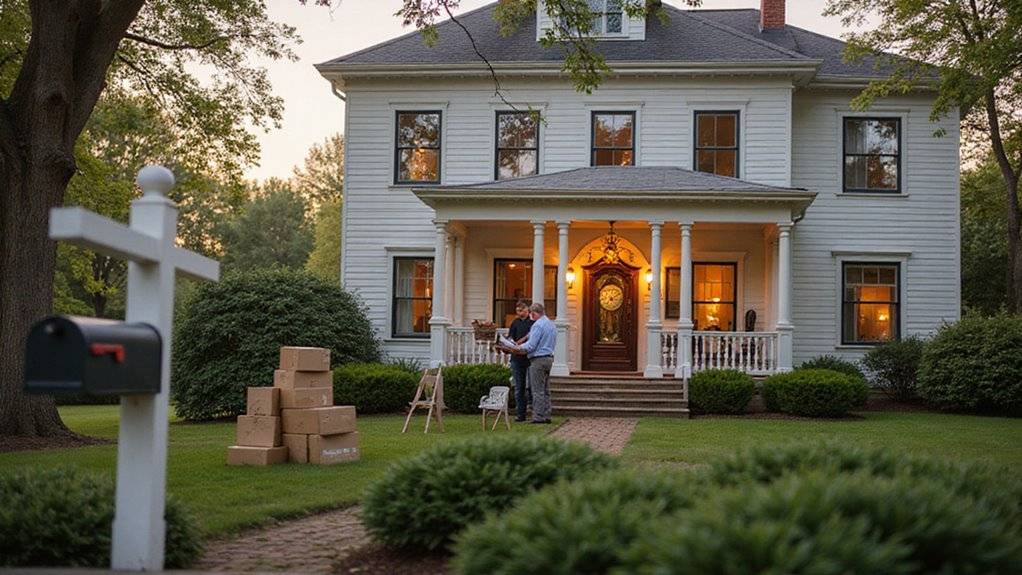Dealing with property sales during probate feels like navigating a complex legal maze without a map. Many executors struggle with timing restrictions and court requirements when selling inherited properties. This causes stress and delays for families already dealing with loss. Fortunately, understanding the probate sale process helps create a clear path forward.
The sale of a house in probate can begin after the court appoints an executor, typically within 30 days post-death. The executor must obtain court approval and a professional appraisal before listing the property, unless the will permits independent administration.
This guide explores every aspect of selling a house during probate, from timing to final closing.
Key Takeaways
An executor must be appointed by the probate court within 30 days of death before any property sale can proceed.
Court permission is required for selling estate property unless the will grants the executor independent authority to sell.
A professional appraisal must be completed to establish the property’s fair market value before proceeding with any sale.
All estate debts and legal settlement requirements must be addressed before the property can be sold and assets distributed.
A court confirmation hearing validates the sale, with the judge reviewing transaction details and approving the final property transfer.
What is Probate and How Does it Affect House Sales?

You can’t legally sell a house until the probate court appoints an executor and transfers authority over the estate. Probate gives the executor legal power to handle the deceased’s property, but it also creates mandatory procedures you’ll need to follow before any sale. Missouri’s probate laws determine whether you’ll face full court supervision or a faster informal process, directly impacting your timeline and costs.
Understanding the Probate Process
Probate transfers property ownership after someone dies. A legal process manages and distributes assets through the court system. The essential steps move property to new owners. An executor must receive court appointment within 30 days of death. Professional appraisers determine the property’s fair market value. The court must approve all property sales during probate.
Missouri law allows two probate options: formal and informal proceedings. The informal path works well for simple estates. Complex situations require formal oversight with additional court supervision.
Legal Ownership During Probate
Legal title belongs to the deceased person’s estate during probate, not heirs or beneficiaries. The probate court must formally appoint an executor to manage the estate’s assets and property. Until this appointment occurs, no one can legally sell or transfer the property. The court grants specific authority to the executor to handle property transactions according to state laws.
Moreover, proper legal channels ensure protection for all parties involved. The executor must follow strict protocols to prevent disputes or legal issues. Any premature attempts to sell property without authorization can result in penalties.
State Variations in Probate Laws
State probate laws create significant differences in real estate transactions across the US. Each state maintains unique requirements for selling inherited property through probate courts. Some states follow the Uniform Probate Code, while others use their own systems.
Key differences affect sale timelines and procedures. Court approval needs vary between mandatory judicial confirmation and simplified processes. Executors receive different levels of authority based on state regulations. Moreover, completion times range from 3 months to over 1 year.
Before starting any probate property sale, research your local requirements thoroughly. State laws determine specific documentation, court appearances, and approval processes.
When Can You Legally Sell a Probate Property?

A probate property sale can legally proceed once the court appoints an executor or administrator. The executor must obtain Letters Testamentary or Letters of Administration before listing the property. This official documentation grants the authority to manage estate assets.
Most states require court supervision and approval for probate property sales. The process differs between formal and informal probate cases. Moreover, formal probate demands explicit court permission before finalizing any sale. In contrast, informal probate allows more flexibility if the will grants specific selling powers to the executor.
What Are the Different Types of Probate Sales?
You’ll encounter three main types of probate sales in Missouri, each with different levels of court oversight. Formal probate sales require full court supervision and approval at each step, while informal probate sales allow you to move faster with minimal court involvement. If the will grants independent administration powers, you can sell the property without repeated court permissions, streamlining the entire process.
Formal Probate Sales
Formal Probate Sales require specific court procedures to legally sell estate property in Missouri. A formal probate sale must gain court approval before listing and finalizing any property transaction. The court requires an independent appraisal to determine fair market value. All heirs and creditors must receive official notice about the planned sale.
The extra oversight protects everyone’s interests in complex estates with disputes or significant debts. This careful process creates a clear paper trail and prevents future legal challenges. Nevertheless, proper planning can help minimize delays during the sale.
Informal Probate Sales
The optimal time to sell a house through informal probate occurs after executor appointment. An executor must wait 4 months after court appointment before listing the property. This delay allows creditors to submit claims against the estate. The entire probate sales process typically takes 6-9 months to complete.
Informal probate offers high flexibility with minimal court oversight. The executor maintains autonomy in pricing and marketing decisions. Legal fees remain lower compared to formal probate, making it ideal for uncontested estates. Finally, clear property titles and proper documentation speed up the sales process. Quick settlements benefit both buyers and sellers.
Independent Administration
Independent administration allows executors to manage estates without constant court supervision. An independent administrator can make decisions, sell assets, and distribute property without seeking court approval for each action. The process saves time and reduces legal expenses.
Three main benefits make this approach valuable. Estate settlements move 60% faster through independent administration. Legal costs decrease significantly due to fewer required court appearances. Executors gain flexibility to respond quickly to time-sensitive opportunities.
For proper execution, administrators must notify beneficiaries of major decisions and maintain detailed records. State laws require regular updates to all interested parties about significant estate transactions.
How to Sell a House During Probate?
Selling a house during probate requires you to follow specific legal steps to ensure a valid transfer of property. You’ll need to obtain court permission, get the property appraised, list it on the market, review offers with your attorney, and potentially attend a court confirmation hearing. Each step protects the estate’s interests and ensures compliance with Missouri’s probate laws.
Obtaining Court Permission
Court permission requires specific steps for selling estate property. The probate court needs a formal petition to review and approve property sales. A detailed property appraisal shows the current market value. The court must validate both documents before any sale can proceed.
Some exceptions exist for easier transactions. Wills with independent sale powers let executors skip court approval. Missouri law 473.487 outlines these rules to protect all parties involved. The process safeguards beneficiary interests and prevents undervalued sales.
Furthermore, the executor must follow proper documentation procedures. Clear records protect everyone and speed up the approval timeline.
Property Appraisal and Valuation
Professional property appraisals determine accurate market values for estate assets. A certified appraiser examines the property and creates a detailed valuation report. This official document protects the estate from future legal challenges.
Missouri law requires property values to reflect the exact date of death. The appraisal must be completed before any estate sales can proceed. A licensed expert’s assessment helps establish fair tax basis and prevents disputes between heirs.
The court reviews this appraisal as part of the official probate inventory. This documentation ensures transparent asset distribution and compliance with legal requirements. Moreover, proper valuations protect executors from potential liability claims.
Marketing the Property
A probate property needs strategic marketing to attract qualified buyers and ensure a smooth sale. Properties in probate require full disclosure of their legal status and timeline to potential buyers. Professional photos help highlight the home’s potential, even in its current condition. Videos and virtual tours can showcase the property to remote investors.
Cash buyers and real estate investors make excellent prospects for probate sales. These buyers understand the process and can close quickly. Real estate agents handle property showings while executors focus on legal requirements.
Reviewing and Accepting Offers
Executors must accept or reject offers based on specific evaluation criteria. Each offer requires review of the sale price, buyer financing status, closing schedule, and any conditions. A thorough comparison helps select the strongest buyer. Cash offers often provide advantages through faster closings and fewer complications.
The court must approve the final sale in formal probate situations. All property documents need to match the details presented to the judge for review. The executor transfers ownership through a special deed after receiving court approval.
Court Confirmation Hearing
A court confirmation hearing validates and approves a probate property sale. The judge reviews the transaction details to protect all beneficiary interests. This formal approval happens before the final property transfer can occur.
Missouri law requires proper notice to all heirs and creditors before the hearing date. The administrator must provide a complete purchase agreement, current appraisal, and proof of proper marketing. Potential buyers can submit higher competing offers during the hearing itself. The court’s authorization allows the sale to move forward to closing. This final step ensures legal compliance and fair market value.
Closing the Sale
The final step transfers property ownership from the estate to the buyer through proper documentation. Your attorney works with a title company to process paperwork and deeds correctly. A closing agent handles all financial distributions according to court orders.
The closing process takes30-45 days after court approval. All liens, costs, and creditor claims must be paid first from the sale proceeds. Any remaining money moves to the estate account for beneficiaries.
As a result, the property sale concludes with clear legal title and proper fund distribution. The estate can then proceed with final settlements.
What Factors Affect Timing of a Probate House Sale?

Several key factors will determine how quickly you can sell your probate property in Missouri. The timeline depends on how fast the court appoints an executor, whether beneficiaries contest the will, and if creditors file claims against the estate. You’ll also need to account for court scheduling delays and address any property condition issues before listing.
Executor Appointment Timeframe
Courts in Missouri take 2-4 weeks to appoint executors for uncontested estates after petition filing. The process starts when you submit required documentation to the probate court. Your appointment officially begins once the judge reviews and approves your petition.
However, appointment times can extend to several months for disputed estates with family conflicts or will contests. Court schedules and case backlogs may cause additional delays. As a result, informal probate proceedings typically move faster than formal hearings. The court issues Letters Testamentary upon approval. This legal document grants you authority to manage the estate.
Will Contests or Disputes
A will contest occurs when someone legally challenges the validity of a will during probate. Legal disputes prevent executors from selling or transferring estate assets until courts resolve the challenge. Common challenges involve questions about mental capacity, undue influence, or improper will execution procedures.
The best approach requires thorough documentation and skilled legal representation. Quick resolution helps preserve estate value for beneficiaries. Smart executors maintain detailed records and seek professional guidance throughout the process. However, most challenges get resolved through mediation or negotiation before trial.
Debt Settlement Requirements
Legal steps must protect both creditors and beneficiaries during probate. Estates must publish notices in local newspapers to notify potential creditors. Valid debts need payment from estate funds before any asset distribution can occur. Estate executors should maintain complete records of all debt settlements for court validation.
A property sale remains possible during the creditor claim period. The final closing should wait until all creditor claims reach resolution. This approach shields beneficiaries from future liability issues. Clear debt settlement protects everyone’s interests in the probate process.
Court Schedule and Backlogs
Court schedules typically add 2-6 months to the probate property sale timeline. Local judges must review and approve key probate documents before sales can proceed. Metropolitan courts in St. Louis and Kansas City face 3-4 month backlogs on average. Rural county courts often process cases more quickly.
To minimize delays, contact the probate court early for current wait times. Proper planning helps prevent extended waiting periods for required hearings. This advance preparation ensures smoother transitions through the probate sale process.
Property Condition Issues
Property condition significantly affects a probate home’s sale timeline and value. Major structural defects like foundation cracks or roof damage can extend selling time by 2-3 months. Safety issues must be disclosed to potential buyers under Missouri law. Poor maintenance attracts fewer qualified buyers.
A strategic approach helps overcome these challenges. Cash investors typically close within 14-21 days on as-is properties. Accurate pricing based on current condition draws more serious buyers. Clear disclosure of known issues builds trust with potential purchasers. Always prioritize transparency about property condition. Your honesty will speed up negotiations and prevent future legal complications.
What Are Common Challenges in Selling Probate Houses?

Common challenges in selling probate houses include family conflicts, title issues, and lengthy legal procedures. Siblings often disagree about the sale price and how to divide assets from their parents’ home. Legal requirements mandate notifications to all creditors and beneficiaries within specific timeframes. Missing heirs or unclear property titles can stop a sale completely.
Furthermore, court schedules move slowly due to case backlogs. Most probate courts take 30-90 days to approve basic sale transactions. A professional probate attorney helps navigate these obstacles and keeps the process moving forward.
What Are the Benefits of Selling to Cash Buyers in Probate?
When you’re managing a probate sale in Missouri, cash buyers offer distinct advantages that can simplify your responsibilities as executor. They eliminate the uncertainty of buyer financing falling through and remove the burden of making costly repairs to satisfy traditional lenders. You’ll also face fewer documentation requirements and can close the sale weeks faster than conventional transactions, helping you settle the estate more efficiently.
Faster Closing Process
Cash buyers can close real estate transactions within 7-14 days. This quick timeline matters for probate sales and estate settlements. Your closing happens faster without bank delays or mortgage approvals.
The process skips traditional requirements like appraisals and financing contingencies. The paperwork remains minimal compared to regular home sales. Most documents focus on the direct purchase agreement and title transfer.
The speed helps save money on ongoing estate expenses. Quick closings allow faster asset distribution to heirs. A smoother process reduces stress during an already challenging time.
No Repairs Needed
No repairs are needed when selling to cash buyers. They purchase probate properties exactly as they are. This approach saves both time and money for the estate.
Cash buyers accept homes in any condition without requiring inspections or repairs. The estate avoids spending funds on renovations or improvements. You can focus on other essential probate duties instead.
With this straightforward process, court procedures become simpler to manage. Furthermore, beneficiaries receive their inheritance faster because there are no repair-related delays. The property sells quickly without costly contractor coordination or lengthy negotiations.
Simplified Documentation
Cash buyers reduce paperwork during probate property sales. The process requires fewer documents since no lender approval is needed. You can close deals faster with direct buyers.
Cash transactions eliminate three key requirements: appraisals, extensive title documentation, and inspection contingencies. The estate benefits from a simpler closing process. As a result, administrative tasks become more manageable.
Moreover, direct cash sales protect the estate from potential legal complications. This straightforward approach helps executors fulfill their duties efficiently. The simplified process allows for quicker distribution of assets to beneficiaries.
Avoiding Traditional Sale Complications
Cash buyers bypass common real estate sale complications completely. A direct cash purchase needs no mortgage approvals, inspections, or realtor fees. Traditional sales take 30-45 days to close, while cash deals finish in 7-14 days.
Moreover, cash sales remove the need for property repairs or staging. The estate can avoid costly maintenance and utility bills during lengthy selling periods. As a result, beneficiaries receive their inheritance faster and with fewer administrative tasks.
In addition, cash transactions offer guaranteed closings without financing fall-through risks. This certainty helps executors fulfill their duties efficiently and reduces stress for all parties involved.
Conclusion
Selling a house in probate can be complex, but understanding the process makes it more manageable. We at Freedom Path Investors help Missouri homeowners navigate through probate property sales. Our team works with sellers in Kansas City, St. Louis, Springfield, and other Missouri cities.
When you need to sell a probate property quickly, traditional market listings might not be the best option. We offer straightforward cash purchases that can expedite the probate sale process. Our experience with probate properties allows us to handle all necessary documentation and court requirements.
At Freedom Path Investors, we specialize in buying probate properties across Missouri regardless of their condition. We can work with executors and administrators to ensure a smooth transaction process. Our cash offers eliminate the need for repairs, real estate commissions, and lengthy waiting periods.







